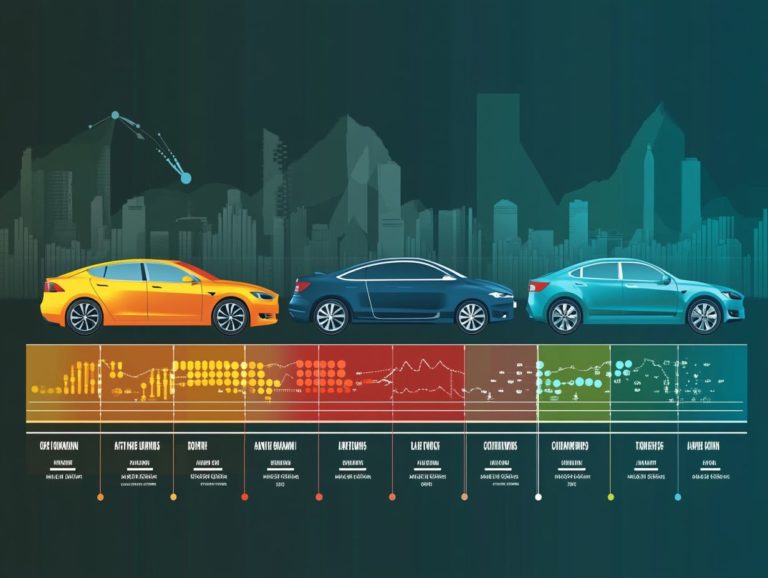Comparison Tools for Electric Vehicles
Electric vehicles (EVs) are revolutionizing your approach to transportation, providing a cleaner and more efficient alternative to traditional gasoline-powered cars. In this article, you’ll explore the exciting world of EVs, from Battery Electric Vehicles to Plug-in Hybrids, while emphasizing their environmental benefits and potential cost savings.
You ll find essential tips for comparing different models based on range, battery life, and features, ensuring you make an informed choice. You’ll discover top tools and apps designed to streamline your EV comparison experience. Get ready to navigate the world of electric vehicles with confidence!
Contents
- Key Takeaways:
- Benefits of Electric Vehicles
- Types of Electric Vehicles
- Key Factors to Consider when Comparing Electric Vehicles
- Top Tools for Comparing Electric Vehicles
- Frequently Asked Questions
- 1. How do comparison tools for electric vehicles work?
- 2. What are the benefits of using comparison tools for electric vehicles?
- 3. Are all electric vehicle models included in comparison tools?
- 4. Can I customize the comparison to my specific needs and preferences?
- 5. Are comparison tools for electric vehicles free to use?
- 6. How accurate are the data and information presented by comparison tools for electric vehicles?
Key Takeaways:
- Electric vehicles offer environmental and cost benefits compared to traditional gas-powered cars.
- When comparing electric vehicles, important factors to consider are range, battery life, charging time, cost, and features/technology.
- There are various tools available, such as comparison websites and mobile apps, to help individuals choose the best electric vehicle for their needs.
What are Electric Vehicles?
Electric vehicles (EVs) mark a significant evolution in the automotive landscape, offering you an eco-friendly alternative to traditional gasoline-powered cars. These innovative vehicles draw power from batteries, drastically cutting down greenhouse gas (GHG) emissions compared to their conventional counterparts.
As technology continues to advance, you’ll find that electric vehicles are equipped with cutting-edge features that elevate both performance and your driving experience think regenerative braking systems (a feature that captures energy when you slow down to help recharge the battery) and smart charging options.
The growing network of charging stations helps alleviate any lingering range anxiety, making it even easier for you to embrace this shift. With incentives like the Federal Tax Credit reducing upfront costs and dependable energy sources from companies like PG&E, now is the perfect time to make the leap!
These advantages support environmental sustainability and create a strong community among EV users, paving the way for a greener future in transportation.
Benefits of Electric Vehicles
Electric vehicles present an array of benefits that go beyond just getting you from one place to another, seamlessly integrating into a lifestyle centered around sustainability. The environmental perks are compelling; by significantly reducing carbon footprints and lowering greenhouse gas emissions, they emerge as a vital choice for those who prioritize eco-friendliness.
Beyond these ecological advantages, the financial incentives are equally noteworthy. As an EV owner, you can revel in reduced fuel costs and lower maintenance expenses. Tools like the EV Savings Calculator are invaluable, enabling you to grasp your long-term financial benefits while fostering a deeper understanding of vehicle options and available charging solutions.
Environmental and Cost Savings
Electric vehicles offer significant environmental and cost savings, making them an appealing choice for you if you prioritize sustainability. By reducing greenhouse gas emissions, EVs contribute to cleaner air and a healthier planet. Expect to see lower fuel costs and energy expenses compared to traditional vehicles, which can yield substantial savings over time.
Using tools like the EV Savings Calculator, you can estimate your potential savings through electric vehicle ownership, showcasing the economic advantages of choosing electric over gasoline-powered options.
With a noticeable decrease in greenhouse gases, shifting towards electric vehicles not only helps in combating climate change but can also lead to lower healthcare costs linked to pollution.
While it’s crucial to consider your charging options, different plans can lead to varying levels of savings. The EV Savings Calculator gives you the power to assess your unique circumstances, from local electricity rates to available incentives, providing a clearer picture of your potential long-term savings.
By prioritizing the evaluation of these factors, you can maximize your economic benefits while making environmentally responsible choices.
Types of Electric Vehicles
Electric vehicles come in various categories, each tailored to fit your unique needs. The primary types include Battery Electric Vehicles (BEVs) and Plug-in Hybrid Electric Vehicles (PHEVs).
BEVs run exclusively on electric power, equipped with substantial battery packs that deliver a completely electric driving experience while producing zero tailpipe emissions. PHEVs blend an electric motor with a gasoline engine, offering you extended driving range and flexibility.
Understanding the differences between these electric vehicle types is essential for making informed choices that align with your driving habits and lifestyle preferences.
Battery Electric Vehicles
Battery Electric Vehicles (BEVs) embody the pinnacle of electric mobility, relying solely on electric power stored in rechargeable battery packs, generating zero tailpipe emissions. These all-electric marvels are crafted for efficiency and sustainability, presenting a variety of models tailored to your unique needs.
Whether you prefer a compact sedan or a spacious SUV, the range of BEV options accommodates diverse preferences and lifestyles. Models like the Tesla Model 3 and the Ford Mustang Mach-E offer impressive ranges exceeding 300 miles on a single charge, easing the range anxiety that often holds potential buyers back.
As charging infrastructure expands and fast-charging stations become increasingly accessible, owning a BEV is a practical choice today. The environmental benefits of moving away from fossil fuels are significant cleaner air and reduced greenhouse gas emissions provide compelling reasons to consider a battery electric vehicle for your next purchase.
By opting for a BEV, you re not just investing in your future; you re also contributing to a more sustainable planet.
Plug-in Hybrid Electric Vehicles
Plug-in Hybrid Electric Vehicles (PHEVs) provide a versatile solution for consumers, seamlessly blending the benefits of electric and gasoline power. With both an electric motor and a gasoline engine, PHEVs allow you to enjoy the best of both worlds. You can drive a certain distance on electricity alone using a rechargeable battery, and once that runs out, the gasoline engine takes over for longer trips, offering unmatched flexibility.
This dual powertrain system slashes your fuel costs and reduces greenhouse gas emissions compared to traditional vehicles, making PHEVs an excellent transitional option if you’re new to electric driving. With various models available, each designed to optimize efficiency and performance, you can find the perfect fit for your lifestyle.
You can easily manage short daily commutes on electric power alone, leading to significant fuel savings. Many consumers appreciate the eco-friendly appeal and economic benefits of this setup, especially when fuel prices fluctuate. You enjoy the convenience of running solely on electric power for local errands while having the reassuring backup of a gasoline engine for longer journeys.
This flexibility makes PHEVs a compelling choice for anyone hesitant about fully committing to an all-electric option, allowing you to ease into an electric lifestyle without sacrificing reliability or convenience.
Key Factors to Consider when Comparing Electric Vehicles
When evaluating electric vehicles, it’s essential to consider several key factors to ensure you make an informed decision that matches your needs and preferences.
Vehicle comparisons typically start with the range of the electric vehicle, as this greatly impacts daily usability. Battery life and charging time are critical for convenience when owning an EV. You’ll also want to factor in the overall cost, which includes not just the purchase price but also long-term savings.
Finally, the features and technological advancements in electric vehicles can significantly enhance your driving experience, making them worth careful consideration.
Range
Range is a crucial factor when evaluating electric vehicles. It dictates how far you can travel on a single charge before needing to plug in.
Understanding the range capabilities of different electric vehicles empowers you to assess their suitability for daily commutes and longer journeys. This ultimately shapes your purchasing decision.
Thanks to advancements in battery technology, many electric vehicle models now boast impressive ranges that often rival those of traditional gasoline vehicles enticing more consumers to embrace the electric shift.
Take the Tesla Model S, for example; it offers an astounding range that exceeds 370 miles, significantly alleviating range anxiety for those contemplating longer road trips. On the other hand, vehicles like the Ford Mustang Mach-E and the Hyundai Kona Electric present competitive ranges of around 300 miles, making them excellent choices for both urban drivers and adventurous souls.
As the popularity of electric vehicle ownership continues to surge, comprehending how these ranges interact with charging infrastructure becomes increasingly vital. This insight allows you to pinpoint which model aligns best with your lifestyle, whether you’re after weekend getaways or a dependable daily commuter.
Battery Life and Charging Time
Battery life and charging time are critical aspects for electric vehicle owners. They influence both the usability of your vehicle and your overall driving experience.
The longevity of your battery directly impacts how frequently you’ll need to recharge, while the charging duration can significantly affect the practicality of owning an electric vehicle. With various models offering different battery lives and charging options, it s essential for you to carefully consider these factors when making your decision.
Understanding the nuances of charging options such as level 1 (which uses a standard household outlet), level 2 (requiring a special home charger), and DC fast charging (providing rapid charging at public stations) can give you the power to optimize your daily routine around your vehicle’s capabilities.
For example, while a level 1 charger may offer convenience for overnight charging, it can take much longer to fully recharge the battery compared to a level 2 charger or DC fast charger. This understanding is not just crucial for maximizing your range and efficiency on the road, but also for preserving the health of your battery over time.
Different electric vehicles come with varied manufacturer recommendations, so staying informed enables you to make more thoughtful and strategic choices regarding your electric vehicle investment.
Cost
When considering the cost of electric vehicles, you must take into account a variety of factors, including the initial purchase price, operating expenses, and potential long-term savings.
While the upfront cost may be higher than that of traditional vehicles, the long-term savings on fuel and maintenance, coupled with the benefits of the Federal Tax Credit, can make electric vehicles a financially appealing option.
It s crucial for you to evaluate both short-term and long-term costs to fully grasp the financial implications of owning an electric vehicle.
The initial purchase price of electric vehicles can vary significantly, depending on the model, brand, and features you choose. Many consumers discover that they can offset this higher price through lower operating expenses, especially when it comes to fuel costs and routine maintenance, as electric vehicles generally require less frequent servicing.
The Federal Tax Credit can also help reduce costs by providing substantial savings upon purchase an advantage that many buyers find invaluable.
By looking into potential incentives and carefully calculating the total cost of ownership, you can make smart choices that fit your budget and lifestyle, ensuring that you maximize your investment in an electric vehicle.
Features and Technology
Electric vehicles come packed with new features that enhance your driving experience. These innovations include regenerative braking, connectivity options, and navigation systems.
These advancements save energy and improve your enjoyment on the road. For example, real-time updates on charging station availability can ease your worries about running out of battery.
With so many options, you can create a personalized driving experience. It’s important to evaluate these features when comparing different models.
Understanding how these technologies work will impact your satisfaction and make ownership easier as you explore electric vehicles.
Top Tools for Comparing Electric Vehicles
As you begin your journey towards electric vehicle ownership, many tools can help you compare options. These resources include online maps that show charging stations, making your planning straightforward.
Platforms like FuelEconomy.gov offer Trip Calculator Software. This tool helps you analyze fuel costs and environmental impacts across different electric vehicle models.
Electric Vehicle Comparison Websites
Comparison websites are vital for consumers looking to understand their options. These platforms provide side-by-side comparisons of specifications, features, and prices.
These websites often include user reviews and range estimations to give you a well-rounded view. You can easily filter choices based on criteria like budget and battery size.
Using comparison tools can lead to smarter investments, ensuring your satisfaction for years to come. Explore what these websites have to offer before making your final decision.
Mobile Apps for Electric Vehicle Comparison
Mobile apps for electric vehicle comparison are essential as you navigate the growing market. These apps provide real-time information about vehicle models, charging options, and pricing.
With user reviews and calculators for savings, these apps enhance your experience. You can research from anywhere, whether during your morning commute or while waiting for an appointment.
Many of these apps also feature interactive maps showing nearby charging stations. This makes route planning easy and convenient.
The inclusion of augmented reality (AR) technology lets you visualize how different models would look in your driveway. These apps empower you to choose the electric vehicle that suits your needs.
Frequently Asked Questions
1. How do comparison tools for electric vehicles work?
Comparison tools for electric vehicles analyze and display data from various electric vehicle models. For those interested in making informed choices, using a price comparison for eco-friendly vehicles allows you to easily compare different features and specifications.
They typically use filters and sorting options to customize the comparison to your preferences.
2. What are the benefits of using comparison tools for electric vehicles?
Using a comparison tool for electric vehicles can save you time and effort. It eliminates the need to research and collect data from multiple sources.
It also allows for a clear and comprehensive comparison, as all information is presented in one place!
3. Are all electric vehicle models included in comparison tools?
Most comparison tools for electric vehicles include a wide range of models, including luxury electric vehicles from different manufacturers and with varying features.
However, it’s always best to double-check and ensure that the specific model you’re interested in is included in the tool.
4. Can I customize the comparison to my specific needs and preferences?
Yes! Most comparison tools let you customize your experience with filters and sorting options. This can include factors like price, range, charging time, and more!
5. Are comparison tools for electric vehicles free to use?
Many comparison tools for electric vehicles are available for free. However, some may require a subscription or payment for access to more advanced features.
It’s best to check the specific tool’s terms and pricing before use.
6. How accurate are the data and information presented by comparison tools for electric vehicles?
The data and information presented by comparison tools are typically sourced directly from manufacturers and are regularly updated.
However, it’s always advisable to double-check the information with official sources to ensure accuracy.





